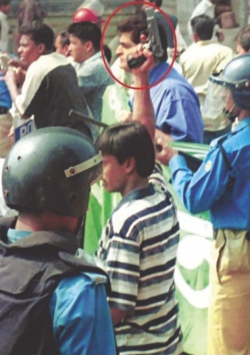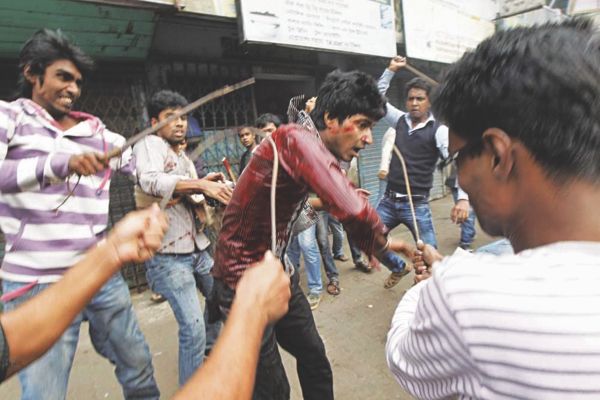| Home - Back Issues - The Team - Contact Us |
 |
| Volume 11 |Issue 50| December 21, 2012 | |
|
|
Current Affairs Licensed to Kill? Shakhawat Liton
On February 3, 2001, the then President Shahabuddin Ahmed at the convocation of Dhaka University said criminal activities (in educational institutions) would be stopped if student organisations were de-linked from political parties. His remarks came in the wake of growing violence and criminal activities in educational institutions that hampered academic activities at that time. Annoyed by the violent and unruly activities of many student leaders and cadres, people by and large had considered Justice Shahabuddin's suggestion as a solution to the growing problems in student politics. Unfortunately, his suggestion did not yield any positive result as major political parties did not pay any heed to it. When Justice Shahabuddin made the suggestion, Sheikh Hasina led Awami League was in power and obviously it was AL's student front Bangladesh Chhatra League (BCL) which established its supremacy in many educational institutions in the country. In doing so, they engaged in fierce battles with the rivals-- Jatiyatabadi Chatra Dal (JCD) and Islami Chatra Shibir. Many students were killed in the violence that took place between them. Some BCL men also got engaged in internal conflict, triggering many violent incidents in many educational institutions. The situation took a different turn with the change of power in October 2001. When the BNP came to power through parliamentary polls held in October 1 of 2001, the JCD, student front of BNP, started to unleash a reign of terror in many educational institutions. They drove out their rivals to establish their control over the campus. Even their internal conflicts were on the rise. The JCD's activities were tarnishing the image of the then newly formed government led by the BNP. But like her predecessor, then Prime Minister Khaleda Zia's administration had also failed to take stern actions against the unruly and violent activities of the JCD. However, on December 2 of 2001 she warned in the parliament that her government would ban student politics if it needed be so. Her warning did not prevent the JCD from carrying out its violent activities. Rather it triggered a debate whether student politics should be banned. The debate never reached a consensus. What Justice Shabuddin suggested in 2001 was highlighted again when the Election Commission led by ATM Shamsul Huda in their electoral reform proposals wanted to de-link student organisations from their parent political parties to save the educational institutions from the violent grip of student politics. In line with Justice Shahabuddin's suggestion, the EC in 2008 had proposed that a political party willing to get registered with the EC must de-link student organisations and other professional bodies by amending its constitution. The EC was in favour of making student politics clean and keeping it confined to educational institutions. It also believed that campus violence would be stopped if the political parties put a halt to patronising their student organisations. In defence of the move, the EC was constantly speaking about the glorious past of student politics and advocating for the restoration of the glory. It was the AL that took the lead against the EC's proposal and refused to completely de-link the BCL. In defence, they cited the historic role of the BCL and long relationship between the AL and BCL. The BNP followed the AL and spoke in favour of keeping relations with the JCD. So, the move lost strength. The AL and BNP dropped names of BCL and JCD from the list of their auxiliary organisations in their constitutions. But they kept the student organisations under its fold, giving them some special status.
Interestingly, the passion the AL demonstrated for the BCL has never been reciprocated. In return, the BCL men has started defaming the AL soon after the party assumed power in 2009. They engaged in violence, extortion, tender manipulation and many other unruly activities, tainting the image of the newly formed government of Sheikh Hasina. Infuriated by the BCL men's criminal activities and internal clashes, the AL chief Sheikh Hasina, on April 4, 2009 at an emergency meeting, decided to quit the post of organisational chief of the BCL and directed law enforcement agencies to take stern action against those involved in criminal activities. After the meeting, LGRD Minister Syed Ashraful Islam told reporters: "She [Hasina] proposed that she would no longer remain organisational chief of the BCL, and the presidium meeting had accepted it. She doesn't even want to see her portrait hanging in the wall of BCL offices." But the administration had severely failed to deliver on the prime minister's directives due to alleged patronisation of many AL MPs and leaders to BCL men involved in criminal activities. Moreover, law enforcement agencies did not want to take risk by going hard on unruly BCL men as taking actions against ruling party men might bring them rebuke form government high ups. So, many BCL-men found themselves beyond the reach of the law and continued with their criminal activities. In the last four years, the BCL has defamed the AL-led government, hampering the educational activities in many educational institutions. And some BCL men's involvement in the recent gruesome killing of Bishwajit Das, an innocent tailor, finally proved how sincere the AL is to curb the criminal activities of the ruling party members. Although news photographers and videos have already made it clear who hacked Bishwajit to death in broad daylight, it was none but the Home Minister Mohiuddin Khan Alamgir who first denied the truth. His denial sparked huge criticism and outcry. But the government high ups did not pay any heed to public sentiment. And more surprisingly, the prime minister's office (PMO) stepped into the scene in favour of BCL men who killed Bishwajit in broad day light. At a press briefing on December 13 at the PMO, the prime minister's Press Secretary Abul Kalam Azad claimed: “None of the alleged killers of Bishwajit is a Chhatra League activist.” In a written statement, the PMO gave particulars of six “alleged murderers”, claiming they included two former members of pro-Jamaat student wing Islami Chhatra Shibir. The statement alleged that members of the BNP and Jamaat-Shibir killed people to put the blame on the ruling Awami League and its associated bodies. The PMO's statement favouring the BCL has surprised many and it has raised a big question why the PMO stepped into the scene to defend the killers of Bishwajit by putting the blame on the opposition? Did people believe the PMO's claim? How did people react? By going through the PMO's claim, M Hasan, a reader of The Daily Star, commented: "PMO has tainted our national image. Such a blatant lie only makes us embarrassed. The whole world knows that these are Chhatra League men. Only our Prime Minister does not." Doesn't Hasan's comment reflect the majority's view? The writer is Senior Reporter, The Daily Star.
|
||||
Copyright
(R) thedailystar.net 2012 |

